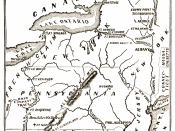2004 DBQ - Sample Essay (9 Essay)
For many years, throughout the 1600s and early part of the 1700s, the British pursued a policy
of salutary neglect (healthy noninterference) toward its colonies. Britain enacted a series of Navigation
Laws, but these attempts to regulate trade were minimally enforced. The colonists had a generally
friendly attitude toward the British overall and they enjoyed the benefits of an imperial relationship
without accompanying restrictions. However, this relationship was dramatically altered by the French
and Indian War of 1764-1763. The course of the war itself significantly affected the political and
ideological relationship of the colonials to their mother country, inasmuch as the colonists found the
British imposition of restrictions and its hierarchical army to be repulsive to liberty, while the British saw
the need for greater imperial control. However, it was the economic aftermath of the war, which left
Britain with a changing war debt and a need to raise new colonial revenues that militated most heavily
against colonial cooperation with the British.
The French and Indian War, called the Seven Years' war in Europe, had its antecedents in the
settlement of the French and the British in the Ohio valley region of the American continent. Both the
French and British sought to control lands in the region, while the Native Americans resisted the
attempts of both to settle. The Indians largely played off of both sides to maintain an uneasy balance of
power, but one group eventually decided to great trading concessions to the British, giving England
greater access to the interior of the continent. France saw this as a threat to its own territories and
summarily constructed fists of defense, like Fort Duquesne. The British followed suit, building a fort of
their own. One such effort was to build Fort Necessity near...


